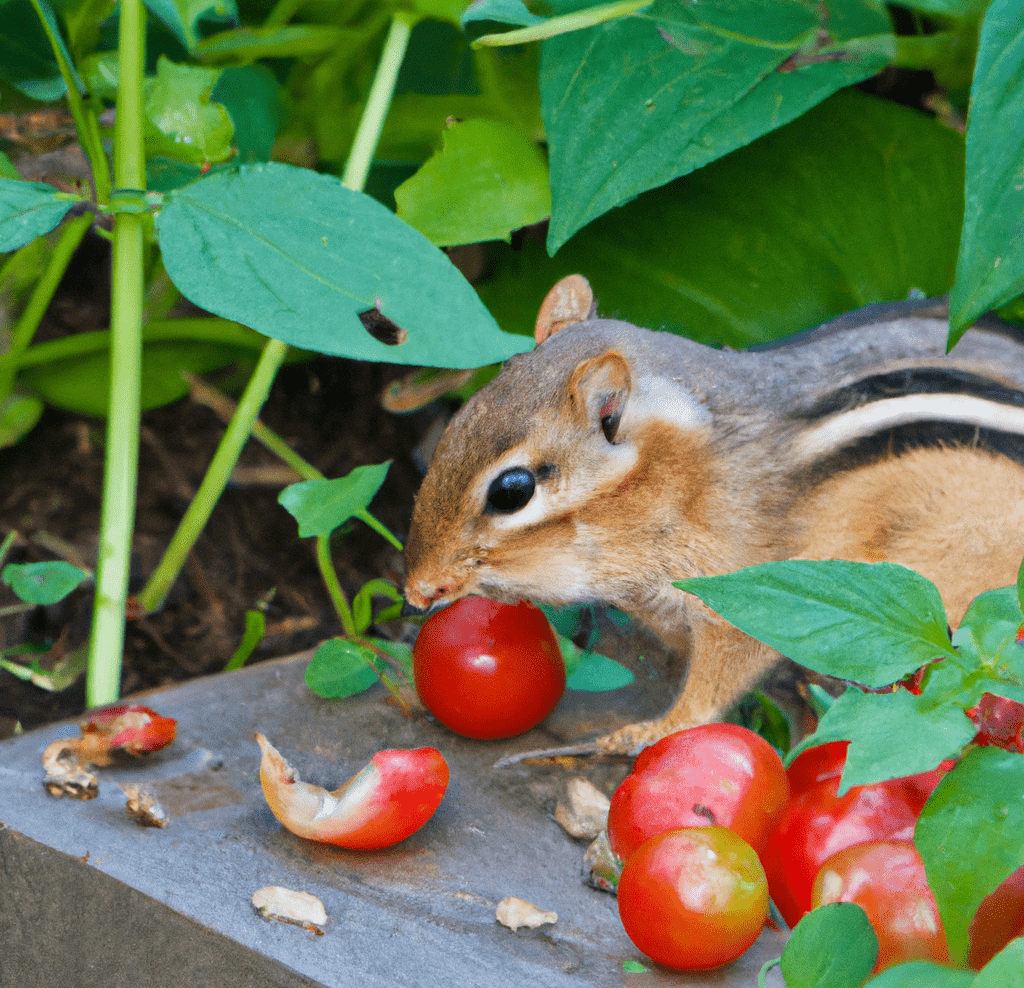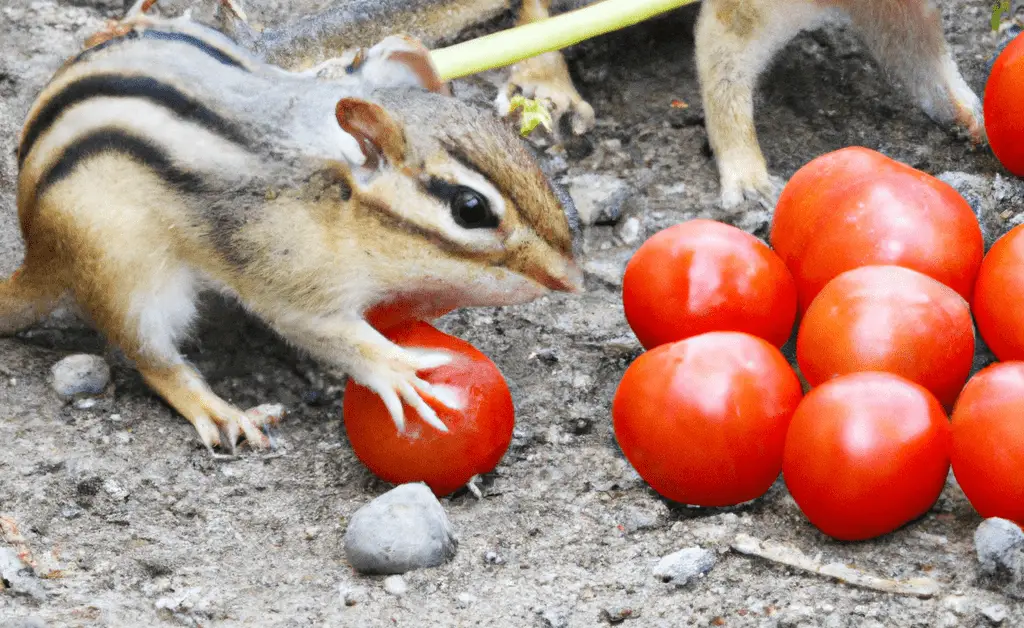Tomatoes are a lot of work to grow, and it can be daunting to get big juicy red fruits by the end of the summer. Anyone who has gardened for more than one season knows that if you want the fruits of your labor, you will need to protect your tomato plants.
Lots of rodents and pests like to feed on tomatoes in the vegetable garden. In the squirrel family, chipmunks seem to be the fondest of these succulent red delicacies. I always see a fair amount of chipmunk activity near ripe tomatoes, and so over the years, I have had to take steps to keep my plants safe.
Do Chipmunks Eat Tomatoes in Your Garden?
Chipmunks do eat tomatoes in the garden, and they also feed on flower bulbs and many herbs and other vegetables. Nuts and small insects are also favorites of chipmunks that collect bird seed and other available food sources in your lawn.
In late summer, chipmunks may start chomping on your tomatoes more for the water in the fruit than from hunger. Most of what chipmunks and squirrels forage are dry nuts or seeds, and fresh water can be hard to find in the summer. Fresh fruit in the vegetable garden, especially plump ripe tomatoes, are full of moisture to quench a chipmunk’s thirst.
Not all the damage caused to tomato plants is the result of direct bites from the chipmunks. These rodents can cause damage to individual plants by pulling up the roots and pushing over healthy plants. While these pests are eating, rodent fecal matter can drop onto other fruits. Chipmunks eating your tomatoes can lead to you becoming ill if their waste is consumed with human food from the garden.
How to Prevent Chipmunks from Eating Your Tomatoes?

Keeping chipmunks out of your yard and stopping them from ripping up your tomato garden can be a challenge. Physical barriers are an effective way to keep these cute critters out of your flower plants. Pungent smells and natural repellents are also effective methods to control chipmunks and ground squirrels. Deterrents and scare tactics can also be combined to keep the chipmunk population under control.
- Physical Barriers – Barrier materials like heavy-duty garden netting and bird netting can block hungry critters from getting your lovely tomato fruits. Chicken wire fencing can block off the entire tomato garden and keep the chipmunk menace from your fruit trees. Bury all netting and fencing between 6 inches deep and a maximum depth of 1′ down to keep chipmunks from digging underneath your barriers.
- Strong Smells – Coffee grounds, cayenne pepper, and garlic cloves all have chemicals that are irritants to chipmunks. Chili powder and the other solutions in a spray bottle can be a deterrent against chipmunks and their keen sense of smell. Predator urine can also be used to keep destructive pests out of your tomato garden.
- Pest Deterrents- Sprinklers, wind chimes, ribbons and pinwheels, and scarecrows can be used to keep chipmunks at bay for a little while. Eventually, the pests will realize the deterrents are not a threat and come into the garden. Changing the locations of deterrents can help scare chipmunks longer.
What Attracts Chipmunks to Your Garden?
One of the best ways to prevent devastating pests from destroying your tomato gardens is to find out what attracts the pests and get rid of those things. Looking at some of the objects that attract chipmunks and either placing those attractants in areas where you want chipmunks or else removing them entirely are ways to reduce wild chipmunk invasions.
Vegetables
Fruits and vegetables in your garden are coveted by chipmunks for the food and water they provide. Chipmunks can eat many parts of plants and will feed on your garden plants all year long. They will follow food scraps and vegetable scraps into the compost pile and damage any garden plants they try to eat off of.
Herbs
Many herbs have very strong smells that attract rodents like ground squirrels and chipmunks. These cheeky critters will destroy sweet-smelling basil and other healthy, fragrant herbs. The seeds of herbs can also attract chipmunks, and most of the damage done to these plants happens as they try to extract unripe seeds from the pods. Whole herb gardens can be destroyed by these cheeky critters.
Birdseed
Common in bird feeders and around our yards, a curious chipmunk will soon find this buffet and come back daily for snacks. In the process of getting the seeds, chipmunks tend to make a big mess. Putting petroleum jelly on the pole of bird feeders can prevent chipmunks from climbing up and getting food.
Mushrooms
Plenty of pests will dine on the mushrooms that grow sporadically in healthy well-composted soil. Chipmunks will dig up mushrooms and love to find them hidden in the soil. As chipmunks hunt for food to try out, they can cause a lot of damage to a tomato garden. Mushrooms growing in the compost can also attract chipmunks, and other rodents to your yard, so try to keep all food waste secured in wire mesh cages.
Flower Bulbs
In the winter, it can become hard for chipmunks to find food. Flowers that overwinter as bulbs can become a target to rodents hungry for food. Bulb cages should be put around bulb plantings to keep them safe from chipmunks in the winter. In the spring, keep an eye on flowering bulbs to make sure there are no signs of chipmunks chomping on the shoots.
Pet Food
Food for animals left out overnight or in a spot accessible to chipmunks can attract these pests. If the food is in the same spot daily, then there is a good chance the chipmunks will have communicated the location of the food source to other groups. Keep stored pet food sealed in containers with tight lids or place inside where pests can’t smell or find them.
Plant Seeds
Freshly sown seed in a garden bed can quickly be carried away by birds and chipmunks. It is hard for wild animals to distinguish between what we are feeding them and what we are trying to grow, so seeds need to be protected. Cover the seeds with soil and bird netting or seed domes to protect vulnerable seeds from hungry pests.
Insects and Bugs
Chipmunks are opportunistic eaters and will dine on insects, grubs, and caterpillars when needed. During times of high bug infestation in a garden, chipmunks may be attracted and decide to come to eat some insects. Keeping all pests under control in your yard and garden can ensure that there is no imbalance resulting in damage to your tomato plants.
Pests Eating Your Tomatoes
Chipmunks aren’t the only pest that loves to eat tomatoes. In order to properly protect your plants, it is important to know what is chowing down on your veggies. Looking at the types of damage each of these common tomato pests does can help you narrow down what’s causing problems in your garden.
| Pest | Type of Damage | What To Do |
| Squirrel | Small bites and pulled-off branches | Cover with wire mesh and use repellent |
| Skunk | little tooth marks on bottom-most fruits | Build a fence around your tomatoes or use raised beds to grow vegetables |
| Chipmunks | Tiny bites on various fruits and chipmunk feces nearby | Hot pepper or garlic spray can be used to deter chipmunks |
| Bugs | holes and lesions instead of scratches | Spray an organic, non-toxic pesticide and remove visible bugs by hand |
Squirrel
Use wind chimes and other motion-activated deterrents to scare off squirrels. Strong smells and animal urine can be used to keep them away from tomato plants as they ripen and are harvested.
Skunk
These animals love tomatoes, but they only eat slightly above ground level. If your tomatoes are high up or in a raised bed, then they will not be able to get a hold of them. A fence around your garden can also keep skunks out, but their sense of smell will have them constantly looking for a way in.
Chipmunks
Repelling chipmunks with strong odors is your best bet. Garlic and chili spray can be an irritant to chipmunks and stop them from coming into your garden. Spraying all around plants on their leaves and stems is the best way to keep all pests at bay.
Bugs
Many types of bugs will eat tomatoes if they are given the chance. Some eat the leaves, others bore into the stem, and a few devour the fruits. Having natural pest predators like dragonflies and ladybugs in your garden can reduce bad bug infestations. Organic selective sprays can be administered to kill target pests and no other insects for safe biological garden control.


